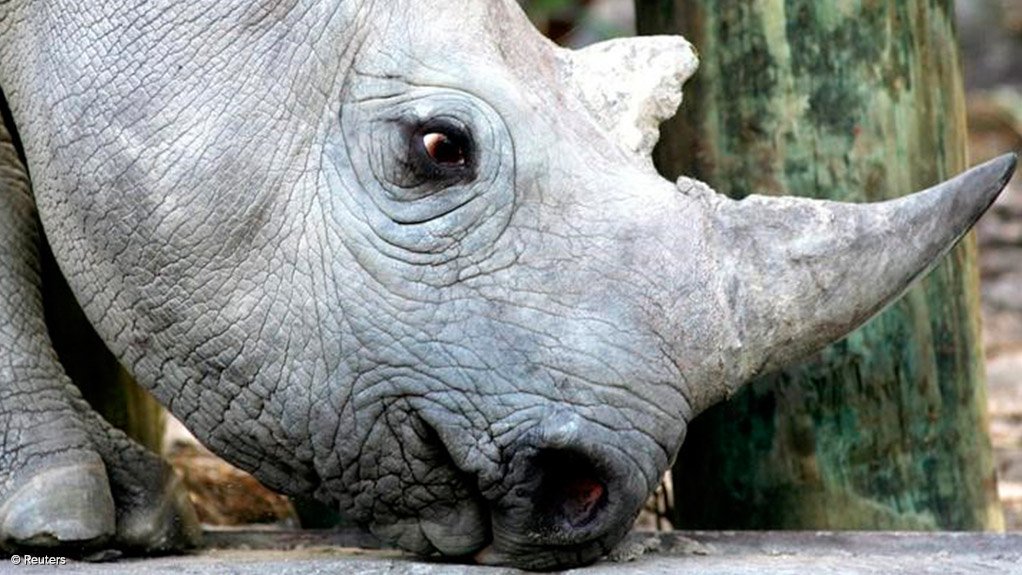The World Bank, through its International Bank for Reconstruction and Development (IBRD), has issued a five-year, $150-million Wildlife Conservation Bond (WCB) sustainable development bond in support of South Africa’s efforts to conserve endangered species.
Also known as the “Rhino Bond,” it includes a potential performance payment from the Global Environment Facility (GEF), which will contribute to protecting and increasing black rhino populations in two protected areas in the Eastern Cape.
These are the Addo Elephant National Park (AENP) and the Great Fish River Nature Reserve (GFRNR). AENP is managed by the South African National Parks (SANParks) and GFRNR is managed by the Eastern Cape Parks and Tourism Agency (ECPTA).
“The WCB is a first-of-its-kind, outcome-based, financial instrument that channels investments to achieve conservation outcomes, measured in this case by an increase in black rhino populations. Rhinos are considered an umbrella species that play a crucial role in shaping entire ecosystems on which countless other species depend,” the World Bank says.
“Through the WCB, investors are supporting the financing of activities to protect and grow a critically endangered species with clear conservation targets, contributing directly to biodiversity, and bringing jobs to local communities through the creation of conservation-related employment in a rural and underserved region of South Africa.”
Rhino protection helps other species that share their habitat. This ecosystem contributes to South Africa’s national economy through tourism, job creation and as an important source of foreign exchange. However, black rhinos are critically endangered mainly owing to poaching and habitat loss.
“South Africa is excited to be at the forefront of an innovative new financial instrument aimed at boosting our efforts to protect the world’s largest rhino population. We would like to acknowledge and express our appreciation for the considerable effort by numerous role players over the past few years that has resulted in this much-needed injection of funding into the biodiversity sector,” says Forestry, Fisheries and the Environment Minister Barbara Creecy.
“We are confident that this [Rhino Bond] will assist in increasing the rhino growth rate and stimulate the development of additional novel, market-based mechanisms to support the objectives of the New Deal for People with Nature. South Africa is committed to securing nature’s contribution to people through well-managed and expanding Conservation Areas that contribute to inclusive rural economic growth in thriving Biodiversity Economy Nodes,” she said.
Conservation investment payments from the WCB allow South Africa to build on established and successful rhino conservation efforts at the AENP and the GFRNR.
Specifically, these parks were selected for this pilot transaction based on their ecological, managerial and financial capacity to achieve rhino conservation outcomes. The conservation efforts at these parks strengthen ecosystem services, like clean water and habitats for pollinators that serve the local citrus industry.
"This bond will significantly increase the funding for the GFRNR, which is much needed to scale up activities to protect and grow our rhino populations and increase benefits to local communities and the economy. Funding will support increased staffing and training, improved national and regional coordination, as well as investments in equipment, infrastructure and technology,” says ECPTA CEO Vuyani Dayimani.
“This bond will support important conservation efforts at AENP and help fill funding gaps that resulted from a reduction in tourism owing to the Covid-19 pandemic. This project is an example of our continued efforts to foster innovation, best practices and unlock new revenue streams to promote a system of sustainable national parks that contribute to the South African biodiversity economy,” comments SANParks acting CEO Dumisani Dlamini.
“The funding will also contribute to fostering community involvement in conservation of these iconic species,” he adds.
CONSERVATION FUNDING INNOVATION
“The Rhino Bond is a groundbreaking approach to enabling private sector investment in global public goods, in this case biodiversity conservation, [which is] a key global development challenge,” says World Bank Group president David Malpass.
“The pay-for-success financial structure protects an endangered species and strengthens South Africa’s conservation efforts by leveraging the World Bank’s infrastructure and record in capital markets. Importantly, it can be replicated and scaled to channel more private capital for other conservation and climate actions and development objectives around the world,” he notes.
Investors in the WCB will not receive coupon payments on the bond. Instead, the issuer will make conservation investment payments to finance rhino conservation activities at the two parks.
If successful, as measured by the rhino growth rate, independently calculated by Conservation Alpha, and verified by the Zoological Society of London, investors will receive a success payment at maturity, paid by the IBRD with funds provided by a performance-based grant from the Global Environment Facility, in addition to principal redemption of the bond.
“This represents a new approach in conservation financing that passes project risks to capital market investors and allows donors to pay for conservation outcomes,” the World Bank said.
“The WCB model provides a new blueprint for the way conservation is financed and has the potential to be a key enabling tool for the delivery of the post-2020 Global Biodiversity Framework. It will draw in private sector investment into conservation and biodiversity, a pressing environmental concern globally, and we are hopeful that this structure can be replicated across various geographies and for the conservation of various species,” says Credit Suisse Global Sustainability biodiversity lead Oliver Withers.
“This innovative and ground-breaking Wildlife Conservation Bond will meaningfully contribute to the conservation of black rhino populations in South Africa. This transaction enables fixed-income investors to engage with the World Bank and Global Environment Facility in support of an important biodiversity impact project. This bond can be an important template for future capital markets engagement in support of biodiversity,” says Citi Banking, Capital Markets & Advisory Europe, Middle East and Africa head Nacho Gutierrez-Orrantia.
Credit Suisse was the sole structurer and joint bookrunner with Citibank, the World Bank says.
EMAIL THIS ARTICLE SAVE THIS ARTICLE ARTICLE ENQUIRY
To subscribe email subscriptions@creamermedia.co.za or click here
To advertise email advertising@creamermedia.co.za or click here











